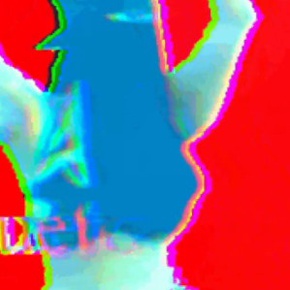Channel
Maajooneh: Stop-Motion on Syria
In this collection, artist Amer AlBarzawi presents two films made by Maajooneh, the collective he founded in 2015. Both films address issues relating to the Syrian conflict, from where AlBarzawi was displaced. This collection is presented here in both English and Arabic, with a foreword by the artist.
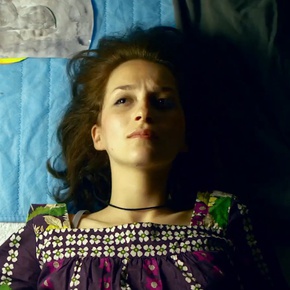
Though I Know the River is Dry
'He has returned to Palestine. On the fraught road through the country he relives the choice that sent him to America and the forces of history now driving him home.' Though I Know the River is Dry is the latest short film from director Omar Robert Hamilton.
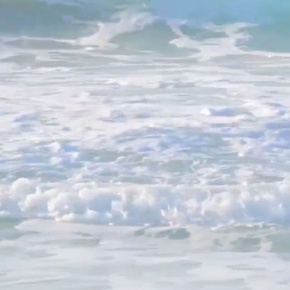
Planetary Records: Performing Justice Between Art and Law
Between March 11–12, 2017, Contour Biennale 8 / DAI Roaming Assembly #12 hosted a series of public events titled 'Planetary Records: Performing Justice Between Art and Law'. Curated by Natasha Ginwala and Rachel O'Reilly, the two-day programme examined the artist's role in challenging normative legal foundations and tracing the collectively witnessed dimensions of present day struggles. According to the curators, '[w]hen artists engage procedures of witnessing, testimonial production and the performativity of the trial, allegories of justice and modes of theatricality surface to haunt the past and present. These spectral zones must constantly be inspected and contested, just as ghosts must be evoked in order to deal with their unfinished legacy.'
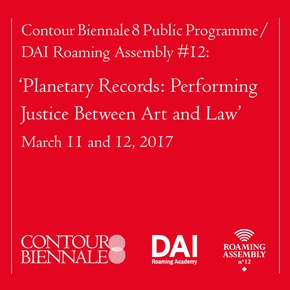
Six Moments from a Revolution: A Mosireen Video Timeline
'Mosireen was a chance combination of activists, filmmakers and artists who came together in the wake of Mubarak's fall,' writes Omar Robert Hamilton, a co-founder of the collective. 'The first mission was to collect and preserve of as much digital memory of the initial 18 Days [of the Egyptian Revolution] as possible. It is [now] hundreds of hours of raw footage.' Presented here is a selection of six videos from Mosireen's YouTube channel.

Déplacement
Syrian choreographer Mithkal Alzghair presents his work Déplacement with a series of provocations: 'What would movement be if it were not voluntary? What is that body that is forced to move, or sometimes to stay immobile? How is the individual re-located after moving into a new context, imposing him to remodel its territory, to rebuild it, to recreate a new identity, for maybe having to leave it again? This is a process of permanent construction and deconstruction.'
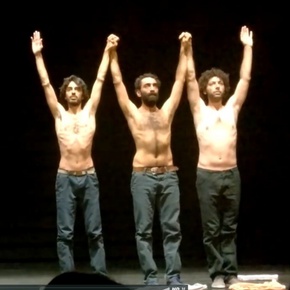
Clash
Egyptian director and screenwriter Mohamed Diab introduces a series of clips from his latest film, Clash. 'Like millions of people,' he writes, 'we were part of the Egyptian Revolution. My brother had the idea of having different people from different backgrounds and points-of-view all together in the back of a police riot van. Cinema is a unique art form which allows the spectator the chance to be in someone else's head, to live their life through their eyes. It is an experience like no other.'
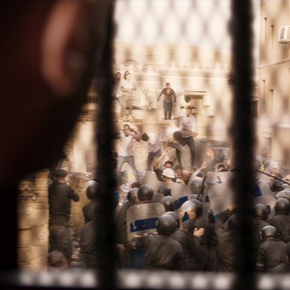
Contour Biennale 8
A special screening channel on Ibraaz throughout the biennale featuring newly-commissioned single-channel video works by Basir Mahmood, Ritu Sarin & Tenzing Sonam as well as an excerpt from the new collaborative project of Filipa César and Louis Henderson.
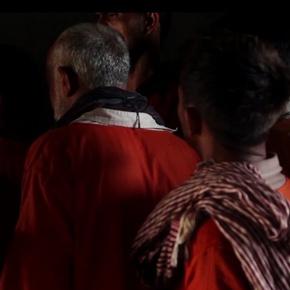
Beethoven vs Chopin
Beethoven vs Chopin combines scenes from the Greek musical The Most Bright Star (Το πιο λαμπρό αστέρι, 1967) and its Turkish rendition into a romantic melodrama The Black Eyed One (Kara Gözlüm, 1970), with audiovisual excerpts from the classic Hollywood comedy Some Like It Hot (1959). While working girls-singers-are the central figures in all three films (played by national and international stars such as Aliki Viougiouklaki, Türkan Şoray and Marilyn Monroe), Beethoven vs Chopin edits out women except for the cross-dressed jazz musicians of Some Like It Hot.
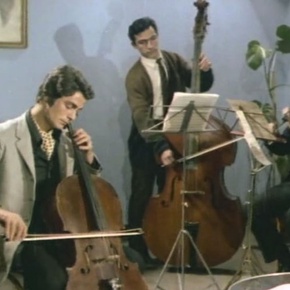
Bouchra Khalili in conversation
Moroccan-French artist Bouchra Khalili discusses notions of borders and displacement with Emma Gifford-Mead, Lisson Gallery's Head of Exhibitions.
The talk was held on the occasion of Khalili's first solo exhibition in the UK at Lisson Gallery London (27 January–18 March 2017).
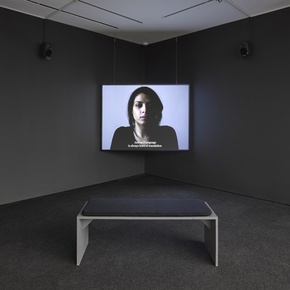
The Sun's Incubator
Feb. 4th, 2011: the family is getting ready to demonstrate, knitting in red its new freedom.The crowds go wild and scream, 'We want to bring down the dictatorship of Mubarak who humiliated the Egyptians during the past 3 decades'. Are the sounds of demonstrations heard by this family, coming from the satellite television channels or directly from the surrounding streets?
May 27th, 2011: a new martyr, little Syrian Hamza al-Khateeb was tortured until his death. Syrian revolts. Revolution always comes out from the womb of misery. Bashar Al-Assad is killing his own people to keep his throne.
Ammar Al-Beik's The Sun's Incubator (2011) interweaves autobiography and current events to create a parable of life and hope, tragedy and despair, change and brutal setback.
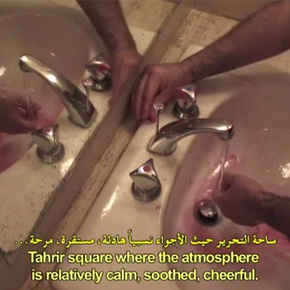
Sanctity
Sanctity tells the story of Areej, a pregnant, young Saudi widow, who will endure anything to protect her unborn child. Filmed in the western region of Saudi Arabia, the story uncovers layers of the human condition within a highly charged setting.

Larissa Sansour Trilogy
Larissa Sansour's trilogy presents a dystopian vision of a Middle East on the brink of the apocalypse. While A Space Exodus envisions the final uprootedness of the Palestinian experience and takes the current political predicament to its extra-terrestrial extreme by landing the first Palestinian on the moon, Nation Estate reveals a sinister account of an entire population restricted to a single skyscraper, with each Palestinian city confined to a single floor. In the trilogy's final instalment, In the Future They Ate from the Finest Porcelain, a narrative resistance leader engages in archaeological warfare in a desperate attempt to secure the future of her people.
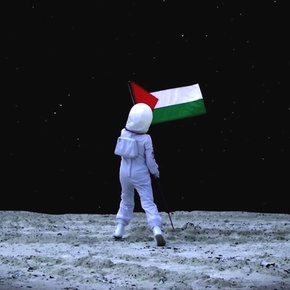
Ordinary Madness (Sareyyet Ramallah)
The relation between humans and nature has been changing enormously during the past two decades. New modern models of administration of the relationship between human beings, and between them and nature have arisen: like massive industrialization, colonial conquests and consumption models, which resulted in new wars, commodification of the world and global warming. What we can call 'world madness'. Ordinary Madness portrays these changes in the Palestinian context, giving an overview of the Palestinian life under modernity rule and asking the audience to reflect on it.
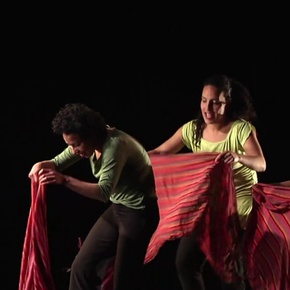
Silsila
Silsila, which is the Arabic word for 'link', is a multi-media project by artist Sama Alshaibi produced over the past seven years in remote, natural locations across the Middle East and North Africa, and comprises the individual films Baraka, Dhikr, Muraqaba and Tariqah, all presented here, exclusively on Ibraaz Channel for one month.
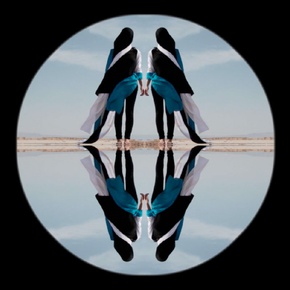
My love for you, Egypt, increases by the day
Project Speak2Tweet is a growing archive of experimental films that utilizes Speak2Tweet messages prior to the fall of the Mubarak regime on February 11, 2011 and juxtaposes them with the abandoned structures that represent the long-lasting effects of a corrupt dictatorship.
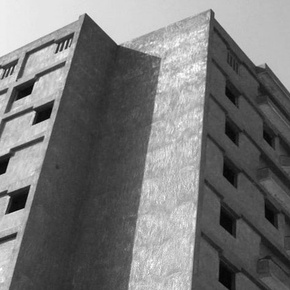
Kiarostami: Silent Moments
Filmmaker Galareh Kiazand presents this tribute to Abbas Kiarostami, who passed away in July 2016. This selection of short films, made under Kiarostami's tutelage during his filmmaking workshops for young directors, gives a unique perspective on the Iranian filmmaker's presence in the ongoing canon of international film.
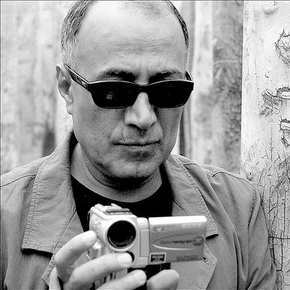
Chta
Chta is a poetic attempt to capture the essence of rain. This experimental short film attempts to unveil what this creature, the rain, has to teach us about ourselves.
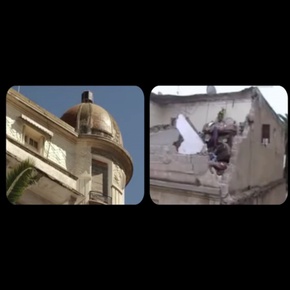
The Tethered
The Tethered (2012) is visually realized within 48 circles, a nod to the context of the birth of Israel in the year of 1948. The archived moments of historical strife and personal struggle are set on a stage of repetition, time and juxtaposition. Through twelve years of personal video documentation, Alshaibi's project extracts the connected yet contentious history from the familiar and often crude depiction of the on-going Palestinian/Israeli conflict.
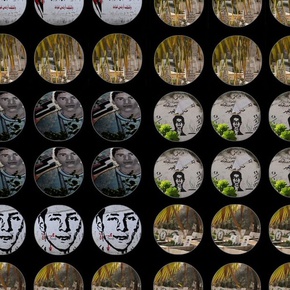
Etel Adnan at Serpentine Galleries' Transformation Marathon
Serpentine Galleries' 2015 Transformation Marathon addressed cultural, political and physical shifts, and asked how significant change can be achieved today. In this video, Lebanese-American artist and poet Etel Adnan describes her relationship with Mount Tamalpaïs and the idea of transformation in her work and life.
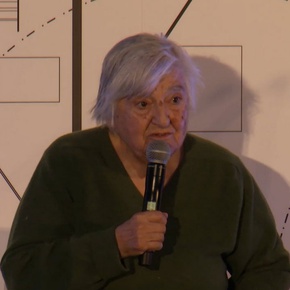
Figures Upon Landscape
Figures Upon Landscape – the first edition of One Immaterial Collection, a series of screening cycles derived from the Beirut Art Center's video art collection – arose from a suggestion and a preoccupation. It is premised upon a range of questions pertinent to interrogating the conception, financing, creation, exhibition, reception and criticism of contemporary art. 'Does curatorial language continue to reify neo-colonizing systems and structures with regard to cultural production from the region', one of these question asks, 'and/or contribute to cultural dilution?'
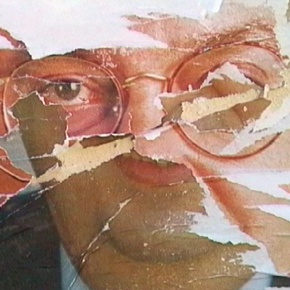
‘You may say I'm a dreamer but I'm not the only one!’
'There is a necessity for a cultural reset – rethinking wouldn't be enough – and it should contemporarily and collaboratively happen in the West, in the East, in the South, and in the North,' writes Mario Rizzi. Ibraaz presents four video works by the artist that, individually and collectively, address the contexts of institutions and civil society in the Middle East and North Africa.
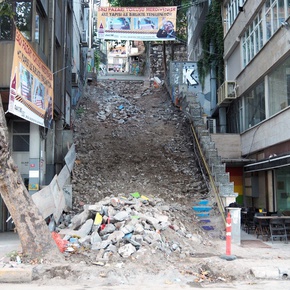
Revisiting Genesis
Revisiting Genesis (2016) takes the form of a web-series in twelve episodes, written and directed by Oreet Ashery. The series explores the philosophical, socio-political, practical and emotional implications of the processes surrounding withdrawal, digital afterlives and legacy, dying, social networks and reincarnations of women artists. With a new episode released weekly, the online narrative unfolds.
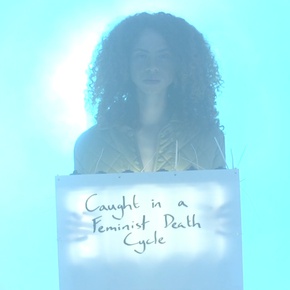
Warehouse Project Talks
Warehouse Project Talks are presented by Alserkal Avenue, Dubai, in support of the Warehouse project by Vikram Divecha. The talks developed out of a series of conversations with various thinkers, scholars and writers who the artist has engaged with in the development of the situation.
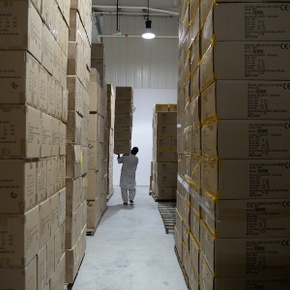
في ناس لبست ”ماسكيتا“ بل إلب
APEAL's 'Museum in the Making' and Temporary. Art. Platform. present: The 2016 Ras Masqa Artists' Residency
'masque “covering to hide or guard the face” masca “specter, nightmare” مسخرة maskharah “buffoon, mockery” from ساخرة sakhira “be mocked, ridiculed”, مسخ masakha “transform” mascarar, mascurer “to black (the face)” mascara “to blacken, darken” masco “witch”
an amplifier...'
Raymond Gemavel presents this work as part of the 2016 Ras Masqa Artist Residency.
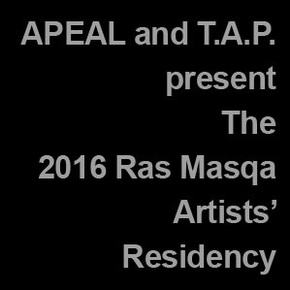
Glocal Reflections
APEAL's 'Museum in the Making' and Temporary. Art. Platform. present: The 2016 Ras Masqa Artists' Residency
Ali El-Darsa's I don't know how I feel about the sun, presented as part of the 2016 Ras Masqa Artist Residency, is composed of four custom-made self-operating speakers using solar energy. Three of the speakers are permanently installed in undisclosed public locations in Ras Masqa village. One speaker remains with the artist and is travelling to various public spaces in Lebanon and abroad.
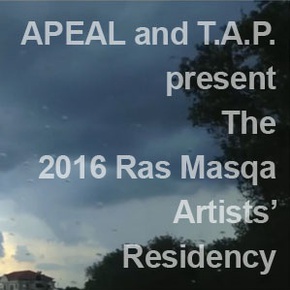
The Tentmakers of Cairo
'Each of the tentmaker's shops opens out onto the street like a cocoon of colour bursting in contradiction to the dust and dirt of the street. The men sit on long benches in the doorway, one foot protruding from underneath a large piece of yellow canvas, a plank of plywood acting as a back rest. Each hunched over, quickly placing accurate stitches into ornate Islamic designs easily found in the mosques and ancient buildings that inhabit the surrounding area.'
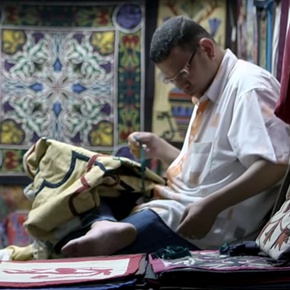
Larissa Sansour in conversation with Nat Muller
Palestinian artist Larissa Sansour discusses her groundbreaking practice with curator and critic Nat Muller. Sansour's work is immersed in the current political dialogues in the Middle East. She addresses this contentious politics through the medium of film, exploring themes of constructed heritages, myth and history as power.
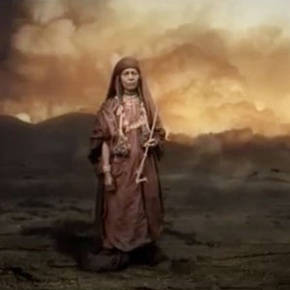
BBC Arabic Cinema Badila: Sun Ra in Egypt
In this interview-based documentary, Tom Bogaert speaks to BBC Arabic Cinema Badila about his work Sun Ra in Egypt.
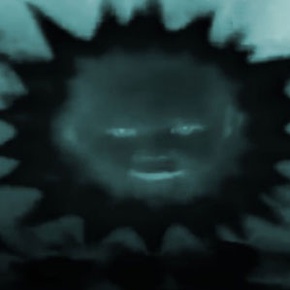
Logical Revolts
Armed with an annotated script of Blue Vanguard (1957) – the UN commissioned film by Thorold Dickinson on the 1956 Suez crisis – Louis Henderson travelled to Egypt in search of the subject for the film Logical Revolts (2012). The script is a fascinating document held in the Thorold Dickinson collection at the London College of Communication. References to any implication of guilt on the part of Israel’s contribution to the crisis, are emphatically erased by the censor’s red pen. The Dickinson script attempts to unravel the complexities of the Anglo-French colonial legacy at Suez.
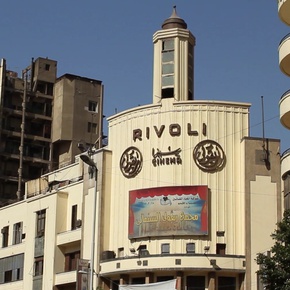
Girl
Ever since the 2011 revolution in Egypt, dozens of women have come forward about their experience with sexual harassment on the streets. Since then, a number of individuals and organizations have begun to monitor and help combat the situation. In this short film, Sondos Shabayek offers an animated reflection on how she believes Cairo society perceives women.
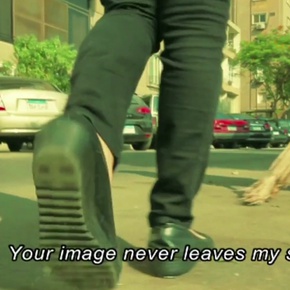
Turbulent
'An important aspect of Turbulent,' writes Shirin Neshat. 'Is that women in Iran are prohibited from singing in public, and there are no recordings by female musicians. The piece took off in various directions and brought about other important questions about the male and female contrast in relation to the social structure. The ultimate question was how each would go about reaching a level of mystical expression inherent in the Sufi music.'
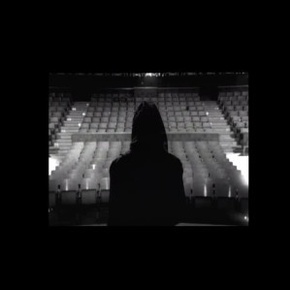
Maybe If You Choreograph Me, You Will Feel Better
Maybe If You Choreograph Me, You Will Feel Better is an interactive performance set between a street and a window. The show takes the form of a relationship between one male audience member and one female performer. The audience member looks out of a window onto the street. Somewhere, among the dozens of passersby, he will find a woman who will obey his every instruction.
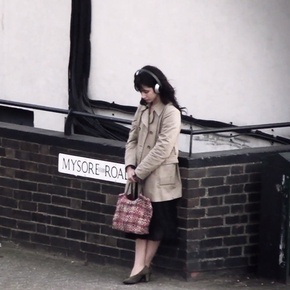
Hamletmachine 2
'Hamletmachine 2 (2010) emerged from a need to continue the research that Zoukak started in 2008 on Heiner Muller's 1977 piece, Hamletmachine. The piece explores the features of contemporary tragedy that murmur to us from beneath the ruins of inherited ideologies that continue to burden us and seep into our bones. We revisited the work in a form that references the non-narrative writing that Muller's deconstructed text proposes. With that, we continue to question the value of the performer's position and action on stage when confronting the realities of failures and loss...'
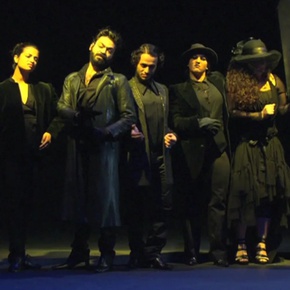
Dying on Stage
On 18 September 2015, Christodoulos Panayiotou presented a new version of his lecture-reading Dying on Stage as part of the Serpentine Galleries' Park Nights Series taking place in the Serpentine Pavilion 2015, designed by selgascano. Dying on Stage explores the hierarchical order of literal, metaphorical and symbolic deaths on the stage, as well as the philological concept of 'tragic irony', through readings, videos and dance. This new version of Dying on Stage, featured dancer Jean Capeille in a choreography by Panayiotou. Presented in collaboration with Fiorucci Art Trust.
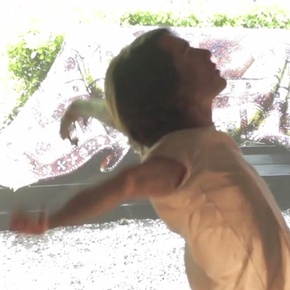
The Dance
Throughout history, music and dance have been closely associated. From the symmetry of the French Minuet to the African counterpoints, the forms and structures of music and dance compositions are usually influenced by nature or our own social interactions.
The Dance – الرقصة is an imaginary choreography framed by a sound/visual representation. The piece strives to contextualise the radical definition of choreography art, which could be summed up as the design of motions and forms. According to the etymology of the word choreography, the literal Greek meaning is dance-writing.
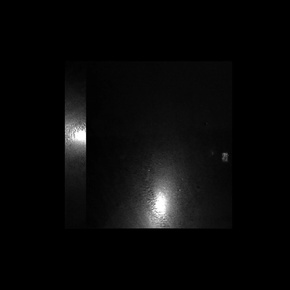
Hysterical Choir of the Frightened
On 25 January 2014, thousands of people gathered in Tahrir Square to celebrate the third anniversary of the Egyptian revolution. On that day, only the supporters of the army and the actions of its commander in chief were admitted into the square. The Muslim Brotherhood and opposition protests taking place in the vicinity were immediately crushed with tear gas and live ammunition. The proximity of the celebrations and the killings led many journalists to call it a day of 'death and dance'. The festive crowd was likened to a 'hysterical choir of fear'.
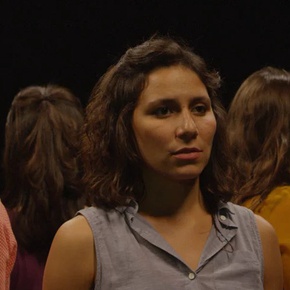
Dawn of the Cold Season
A Video Installation
Dawn of the Cold Season is Sussan Deyhim's video installation, inspired by Forough Farrokhzad's poem Let us Believe in the Beginning of the Cold Season, published after her death in 1967.
The poem is considered one of Forough Farrokhzad's, deepest existential poems about deterioration of youth and life source. Its ending surprises us as she hopes for the frozen nature to irrigate the soil for new beginnings.
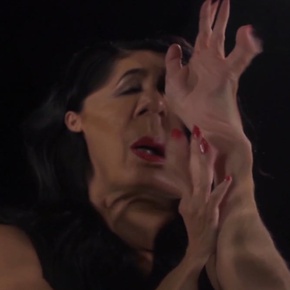
Art in Response to Conflict
A Roundtable Discussion from The Middle East Institute
In Februrary 2016, The Middle East Institute co-hosted a panel discussion exploring the value and impact of the arts in conflict zones. The panel was organized with the Media Lounge at the College Art Association's annual meeting in Washington, D.C.
The panel brought together artists, scholars, policy-makers, and experts from NGOs, international organizations, and the media to discuss the role of the arts in response to conflict, and the positive impact art can have on affected communities. In addition, they examined the role art plays in relief work and peace-building initiatives in conflict zones such as in the Middle East, and ways to support this work.
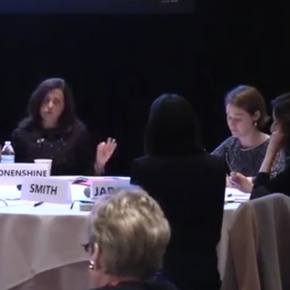
Art Dubai's Global Art Forum 2016: The Future Was
Featuring live talks guided by a curated theme, the tenth edition of the Global Art Forum explores the ways in which artists, writers, technologists, historians, musicians and thinkers have imagined – and are shaping – the future. Titled The Future Was, Global Art Forum 10 is conceived by Shumon Basar as Commissioner, with Amal Khalaf and Uzma Z. Rizvi as co-Directors.
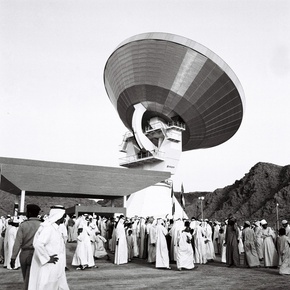
The Art of Disagreement
The Art of Disagreement (2016) brings together 30 performers in the gallery space, reading, singing, dancing and fist-fighting, all to explore the topic of political disagreement.
Referring to the political process in Turkey in the recent years, in which the country's major four parties can not agree to make a new constitution, to build a coalition or even simply have a constructive public debate. The performance asks these questions "Is it possible to accept disagreement and civilize it? Can one benefit from a conflict and learn from it? Or is disagreement equal to rage and chaos?”
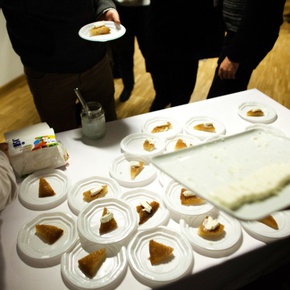
Listening Through a Beam of Intense Darkness
On 3 December 2015, as part of Seth Ayyaz's sound exhibition Listening Through a Beam of Intense Darkness (fig-2 week 48/50, hosted at the ICA, 30 November–6 December 2015), Ayyaz performed a triptych of electroacoustic works addressing Islamic sonic culture.
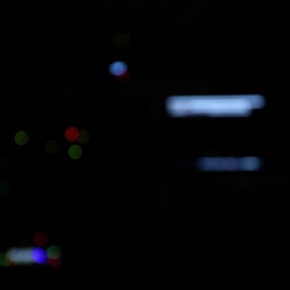
The Invisible Scent of History
The Invisible Scent of History is a screening programme of video works originally conceived as part of the project Visible/Invisible, Art & Politics. Presented at the Media Lounge in collaboration with the 104th International College Art Association Conference, it takes place from 3–6 February 2016 in Washington DC.
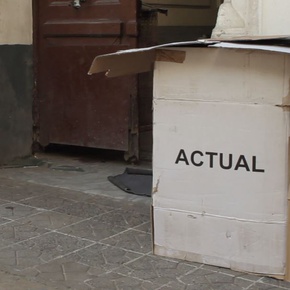
Passing On II
'In 1980, my first Turkish gymnastic teacher gave me a tape of herself performing movements she had developed throughout her life... I selected 4 four movements and taught them to my daughter-in-laws, my granddaughters, her former students, and my current Pilates teachers.'
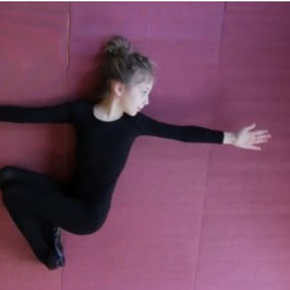
Corbeaux
'The traditional 'aita performance in Moroccan society is often overtly sexual... the women sing about lovers, adultery and abandoned family or roots.These performances are deliberately designed to infiltrate the public space of ritual and ceremony with the intimacies of private life.' In this video, filmed exclusively at Home Works 7, Ibraaz presents Corbeaux by Bouchra Ouizguen.
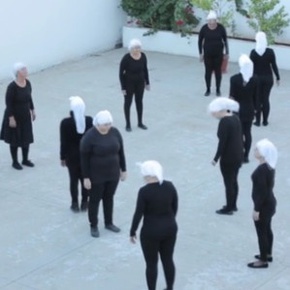
Last Man Out
Last Man Out is Fayçal Baghriche's most theatrical presentation. Here, the artist embodies the character of a man known as William Rodrigquez, whose story Baghriche discovered on the internet. Rodriguez's claim was that he was the last man who left the World Trade Center on the day of the 9/11 attacks.
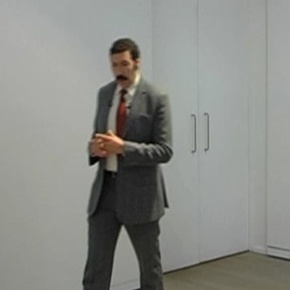
This Lemon Tastes of Apple
Iraq, 17 April 2011
Kurdistan – Northern Iraq was called by Sadam, Allah's paradise on earth. I started to understand the irony after 1988 when I was told by some of our relatives who survived the chemical attack in Halabja, that the chemicals smelled like apple...
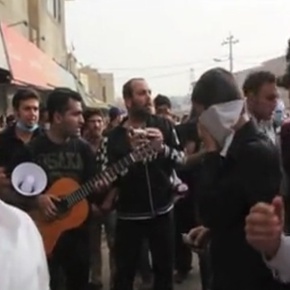
Erasing
Erasing was a durational performance piece that consisted of a large display table, a set of archivist tools and an inkjet photograph approximately 58" x 77" in size. Each day, the artist ritually selected a cubic square of the image to cut from the photograph while an assistant documented the process. The tiny photographic squares were then pinned to the display table while floating above its surface.
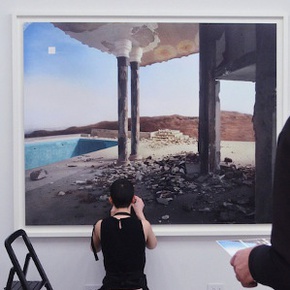
Bit Téléférique
Bit Téléférique was Dictaphone Group's first site specific work, performed in 2010. The piece was a response to the collective's questions regarding the abrupt urbanization of Jounieh city, just north of Beirut. The performance took the public on a journey on one of Jounieh's cable carts going from the sea towards the mountains.
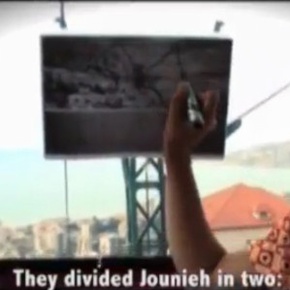
My land 2
Anas Al-Shaikh's two-channel work My land, 2 consists of a close-up video of Bahrain's red-and-white flag and another presenting the artist's naked torso with his back to the viewer. As the flag begins to fly and music starts to play, the artist beats time on his face with a series of rhythmic, sharp slaps.
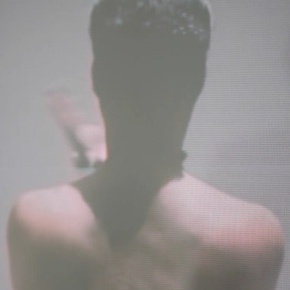
Curating Live Art
Performances at Echoes & Reverberations
In this video, produced exclusively at the exhibition Echoes & Reverberations, at the Hayward Gallery, London, in July 2015, Ibraaz speaks to curators Cliff Lauson and Aaron Cezar, and artists Jumana Emil Abboud and Samah Hijawi about the show, its examinations, and the challenges and opportunities about performing and curating live art.
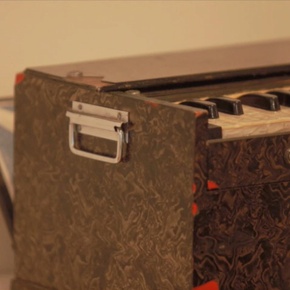
Chic Point (excerpt)
Fashion for Israeli Checkpoints
Chic Point juxtaposes the fashion show with a series of documentary stills from checkpoints, placing the spectator in a position that paraphrases the soldier's gaze. The haute fashion line transfers the marking from the body to the apparel, and to the ensuing playful possibilities inherent in the relationship between the clothes and those who are wearing and removing them.
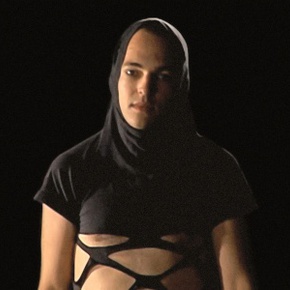
Dissonant Archives
To celebrate the launch of Dissonant Archives: Contemporary Visual Culture and Contested Narratives in the Middle East, edited by Anthony Downey (I.B. Tauris, 2015) in September 2015, Ibraaz held a panel discussion at Rivington Place. Here, a range of invited participants responded to the notion and concepts surrounding the archive and contemporary visual artistic production.
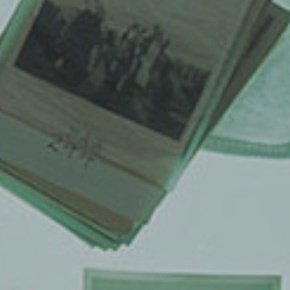
A Kind of Machine Called Liberation
A Kind of Machine Called 'Liberation' uses concrete bricks, comments on urban destruction. Responding to the US invasion of Iraq, this work operates as a visual metaphor for the disaster that the war would provoke. Yilin lies with his leg trapped beneath a circular wall of concrete blocks, as a grown man on a child's bicycle wheels over the surface.
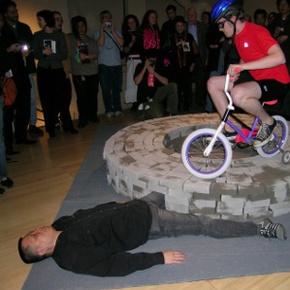
A Tress of Hair
A Tress of Hair is based on two short stories written by the nineteenth century French writer Guy de Maupassant. La Chevelure (A Tress of Hair) tells the story of a madman who finds a tress of hair hidden in an old cabinet and falls in love with it. Berthe (Bertha) is the story of a girl with learning difficulties, who is trained by her doctor to recognise mealtimes by the clock. When fused together, these two stories become an allegorical cycle of waste; waste of emotions, and of obsession.
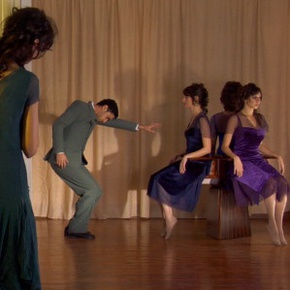
Bent Jbeil
As the artist meanders through Bent Jbeil's old centre, amidst rubble and destruction from the Israeli assault on Lebanon in the summer of 2006, he recites verse from surat Al-Baqara in the Qur'an (verses 40 to 123), that refer specifically to the relationship between Jews, Christians and Muslims, and relays the story of Moses and the people of Israel. Here the artist inserts himself into the scenes of destruction, with a simple gesture of reading, to draw attention to the histories and ideologies that feed into contemporary conflict.
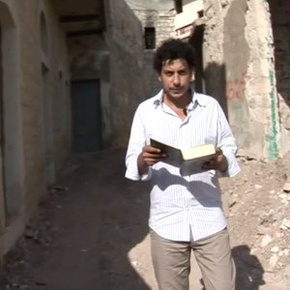
Curating Performance Art
Aaron Cezar, Delfina Foundation
In this video, made exclusively for the Ibraaz channel, Aaron Cezar, Director of Delfina Foundation, London, and curator of A Prologue to the Past and Present State of Things gives a video tour of the exhibition of work by thirteen international performance art practitioners, part of the launch of Delfina Foundation's new research and commissioning platform Staging Histories.
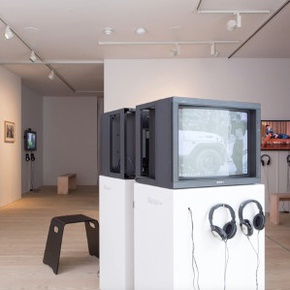
Jaou Tunis 2015
The third iteration of JAOU took place at the National Museum of Bardo in Tunis from 28–29 of May, 2015. Artists, curators, academics, lawyers and diplomats discussed 'Visual Culture in an Age of Conflict'. Panel themes included the future of art institutions, artistic practices, international relations in the Middle East, and Platform 009's focus: performance art across the region.
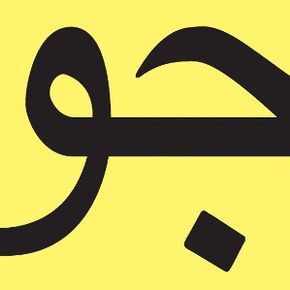
Point, Line, Particles
Point, Line, Particles (2008) goes against the principles of formal composition proposed by Kandinsky in Point and Line to Plane (1926), that a straight line is the product of a force applied in one direction. Here, the force that creates the line is exercised through the media and not by the artist.
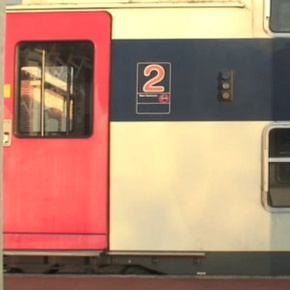
Documentation of Making Work
To accompany his extensive conversation with Nujoom Al Ghanem, Hassan Sharif presents documentation of making works from between 1995 and 2013 in a video edited by Craig Stallard.
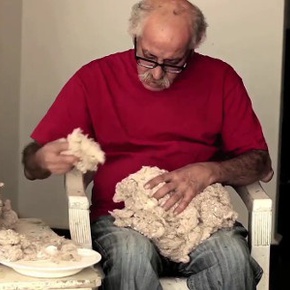
Jarideh
Jarideh (2010) is a one-on-one performance set in a public café where no one other than the audience member knows that a performance is taking place. It is a secret encounter and a highly suspicious mission designed by artist Tania El Khoury and performed by herself and her partner in crime, the participating audience member.
Jarideh is inspired by spy film aesthetics, the Metropolitan Police's terrorism awareness report, and resistance operations made in the past by Lebanese women.
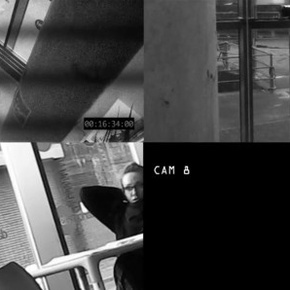
Performance as Process: Jumana Emil Abboud at Delfina Foundation
In this video, made exclusively for the Ibraaz Channel, Sheyma Buali talks to Jumana Emil Abboud about her participation in the residency project Performance as Process at Delfina Foundation, Spring 2015.
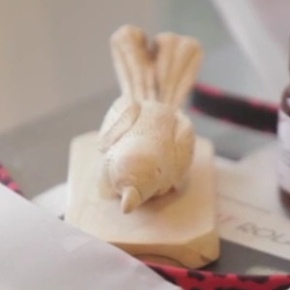
Practices of Performance Art: Jumana Emil Abboud
In this video, made exclusively for the Ibraaz Channel, Sheyma Buali talks to Jumana Emil Abboud about her practice as an artist and how her idea of performance extends into the visual arts in forms as diverse as drawing, text, sculpture, and installation.
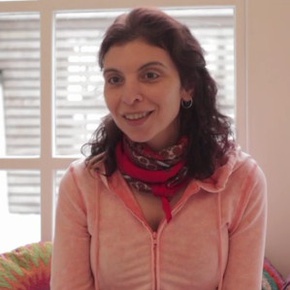
Global Art Forum 8
In March 2014, Ibraaz and the Kamel Lazaar Foundation launched an online media partnership with Art Dubai 2014 for the eighth iteration of the Global Art Forum.
In these recordings from the Global Art Forum, artists, writers, curators, and practitioners discuss and argue the ever-changing role of the Middle East in the global context of visual cultures. Each video is accompanied by an English- and Arabic language transcript of the proceedings.
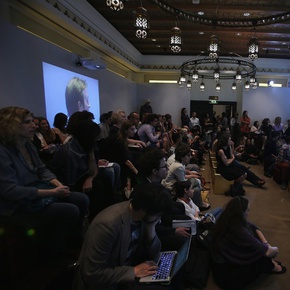
Ibraaz Talks: Global Art Forum 8
In March 2014, Ibraaz and the Kamel Lazaar Foundation launched an online media partnership with Art Dubai 2014 for the eighth iteration of the Global Art Forum.
In this series of exclusive interviews, Ibraaz talks to participants of Global Art Forum 8 to discuss their roles in the event and their thoughts on the wider situations of visual culture in the Middle East.
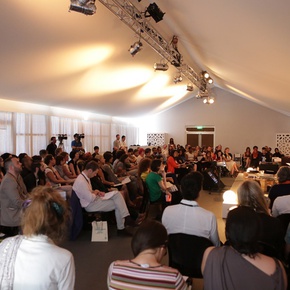
Global Art Forum 8
Live
Ibraaz and the Kamel Lazaar Foundation are pleased to announce that they are the online media partners, alongside the International New York Times, for Art Dubai's 2014 Global Art Forum. Ibraaz will be streaming the forum live from the Dubai venues, and publishing exclusive video interviews with the panellists, individual panel discussions, and bilingual transcriptions events from both Dubai and Doha.
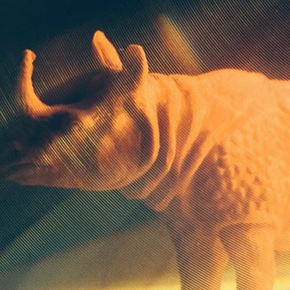
Slavs and Tatars in conversation with Anthony Downey
Language Arts at The Third Line
In this interview, Ibraaz Editor-in-Chief Anthony Downey talks to Slavs and Tatars about the group's interest in language, its history and humour, and the central role that language plays in the research, development and manifestation of their artwork.
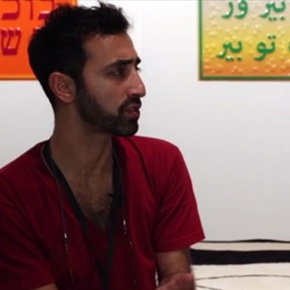
The Future Imperfect Lectures
The idea of the future, pregnant with an infinity of possibilities, is more fruitful than the future itself, and this is why we find more charm in hope than in possession, in dreams than in reality.
– Henri Bergson
Ibraaz presents the full lectures, presentations, panel discussions and Q&A sessions from Future Imperfect: Cultural Propositions and Global Perspectives, hosted at Tate Modern, 9th November 2013.
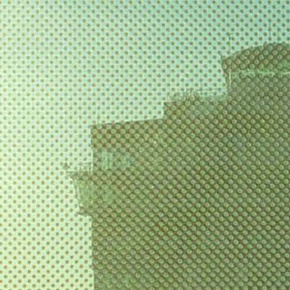
Future Imperfect
Ibraaz is pleased to announce the timetable and speakers for Future Imperfect: Cultural Propositions and Global Perspectives
The idea of the future, pregnant with an infinity of possibilities, is more fruitful than the future itself, and this is why we find more charm in hope than in possession, in dreams than in reality.
– Henri Bergson
Venue: Tate Modern (Starr Auditorium)
Date: 9th November 2013
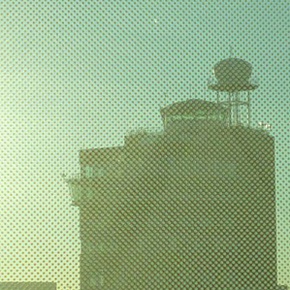
Ibraaz Talks: 13th Istanbul Biennial
Ibraaz Talks is a series of specially curated conversations with artists, curators and writers. Participants are invited to respond to a particular issue or keyword that addresses formal and conceptual issues affecting both their personal practices and contemporary visual culture. Initiated at Art Dubai in 2013, this latest series was staged at SALT Beyoğlu during the opening days of the 13th Istanbul Biennial.
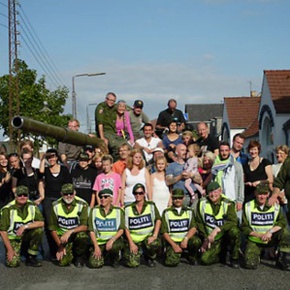
10 Years On: Art and Everyday Life in Iraq and Iran
Ibraaz Talks: Wafaa Bilal
Ibraaz Talks is a series of specially curated conversations with artists, curators and writers. Each participant is invited to respond to a particular issue or keyword that they feel in some way addresses formal and conceptual issues affecting contemporary visual culture. This response, from Wafaa Bilal, was recorded during the conference 10 Years On: Art and Everyday Life in Iraq and Iran, organised by Winchester Centre for Global Futures in Art, Design & Media, in partnership with Ibraaz. It was held in London on 7th and 8th June 2013.

10 Years On: Art and Everyday Life in Iraq
Ibraaz Talks: Slavs and Tatars
Ibraaz Talks is a series of specially curated conversations with artists, curators and writers. Each participant is invited to respond to a particular issue or keyword that they feel in some way addresses formal and conceptual issues affecting contemporary visual culture. This response, from Slavs and Tatars was recorded during the conference 10 Years On: Art and Everyday Life in Iraq and Iran, organised by Winchester Centre for Global Futures in Art, Design & Media, in partnership with Ibraaz. It was held in London on 7th and 8th June 2013.

Ibraaz Talks: Art Dubai 2013
In March 2013, Ibraaz launched its public programme in partnership with Art Dubai. Dubbed Ibraaz Talks, this is a series of specially curated conversations with artists, curators and writers at Art Dubai. In this series of conversations, artists, writers, and curators came together at Art Dubai 2013 to discuss a range of topics, critical in contemporary art: from domesticity, to science fiction, to automobiles.
